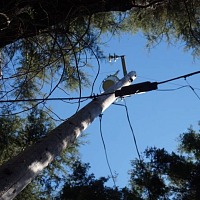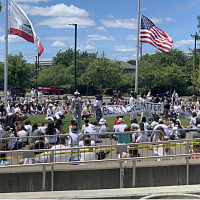By Araceli Martinez Ortega, La Opinión
 For two days, thousands of undocumented immigrants in California have been unable to reach the non-profit organizations that distribute $500 in aid from the state’s new disaster relief fund.
For two days, thousands of undocumented immigrants in California have been unable to reach the non-profit organizations that distribute $500 in aid from the state’s new disaster relief fund.“I feel disappointed. I’ve been calling since yesterday and nobody answers the phones,” said Martina Avila Mendez, a taco and hot dog street food vendor in Los Angeles.
In April, Gov. Gavin Newsom announced a $75 million Disaster Relief Assistance for Immigrants fund that will support about 150,000 immigrants affected by loss of income during the coronavirus pandemic.
Monday was the first official day for undocumented immigrants to call the 12 nonprofits that the state chose to distribute the aid.
But many immigrants reported that their calls were never answered by the Coalition for the Rights of Immigrants, one of three nonprofits serving Los Angeles and Orange counties. At the Central American Resource Center, which serves Los Angeles, the calls were answered but immediately put on hold. After hours of waiting to speak to someone, the calls were cut off.
(Image: California Governor Gavin Newsom. Credit:Gage Skidmore.)
The state program provides immigrants who are ineligible for federal stimulus checks a one-time payment of $500 and up to $1,000 per household. Applicants must provide documents that prove identity and address, and demonstrate that the coronavirus affected their employment. The funds are first come, first-served, and they are expected to help only 10 percent of undocumented residents in California.
“I am disappointed, and I feel humiliated to be begging for those $500,” Avila Mendez said.
Since the start of the pandemic, she and her husband haven’t been able to sell their food on the streets of Los Angeles.
My husband was recently diagnosed with diabetes due to so much stress. Depression is affecting me, and out of nowhere I start crying. We already owe a month of rent. I don’t know how we are going to pay for the month of June,” she said.
The two nonprofit groups declined to answer questions about how much the state awarded each organization, how much staff they have to answer the phones or how they will resolve the problems. Representatives of the groups said that all interviews related to the project must be approved by state officials.
“Our nonprofit partners are receiving a high number of inquiries and are working as quickly as possible to respond to people applying for assistance on a first-come, first-served basis,” the state Department of Social Services said in a statement Wednesday. “Nonprofits are working to set up additional phone lines for expanded capacity. The nonprofits have all received grant funding from the Department to support the operational costs of delivering the application assistance and enrollment services.”
As of Tuesday, more than 6,500 applications had been submitted statewide. “Data on the number individuals who have been provided the disaster relief assistance is not available at this time,” the department’s statement said.
The Coalition for the Rights of Immigrants posted on Twitter at the end of the day that on Monday they helped 688 residents of Orange and Los Angeles counties apply for aid.
The Central American Resource Center tweeted that they received 50,000 calls the first day and that their phone lines were saturated. “We understand the frustration and we are doing the best we can,” they said.
With each passing day, helplessness and frustration grow among immigrants.
The two nonprofits along with the Asian Americans Advancing Justice said they served 1,644 residents of Los Angeles and Orange counties on the first day of the program. These immigrants will receive a total of $822,500 through debit cards.
“We knew that with at least 2.4 million undocumented immigrants in California, the response to the DRAI program would be unprecedented,” Coalition for the Rights of Immigrants Executive Director Angelica Salas said in a statement.
The group announced that the first family they helped is of mixed status, with a husband who is a permanent resident and an undocumented wife. They usually make a living as corn vendors on the streets, but neither of them have been able to work in three months.
The nonprofits are supposed to answer phone calls from 9 a.m.to 5 p.m., Monday through Friday through June 30.
“We are working diligently to help as many people as we can, and dealing with technical problems that may arise,” Salas said in the statement.
Stewart Kwoh, founder of Asian Americans Advancing Justice, said that as soon as the phone lines were opened, thousands rushed to call for help.
“It is clear that much more help is needed in order to assist our immigrant communities who are suffering in the midst of this crisis,” he said.
Martha Arevalo, director of the Central American Resource Center, said that with so many people trying to apply for aid the first day, the need is huge. “We are going to work to assist as many people as we can.”
With each passing day, helplessness and frustration grow among the immigrants affected by loss of income during the pandemic.
“In two days, no one has answered us, and that makes us very sad. We are asking for help because there is no work during the pandemic. We are going to keep calling, but we are no longer excited,” said Lourdes Vázquez, who works in the childcare business and has been in the country for 25 years.
Ignacia Sánchez, a tamale vendor, has been on the phone for two days calling the organizations in Los Angeles and Orange counties.
“I don’t know what happens, because they don’t answer the phone. They’re just cheating on us. If we had a job, we wouldn’t be asking for anything,” she said.
Sánchez and her husband, who is a day laborer, have not been able to work since March. “Our situation is critical. We will continue trying until they answer,” she said.
To apply for the aid, undocumented immigrants should contact the group representing their area:
Northern California:
California Human Development Corporation
(707) 228-1338 www.californiahumandevelopment.org/
Covering Alpine, Amador, Butte, Calaveras, Colusa, Del Norte, El Dorado, Glenn, Humboldt, Lake, Lassen, Mendocino, Modoc, Napa, Nevada, Pleasure, Plumas, Shasta, Sierra, Siskiyou, Solano, Sonoma Tehama, Trinity
Bay Area:
Catholic Charities of California
Alameda and Contra Costa: www.cceb.org
Marin, San Francisco, San Mateo: www.catholiccharitiessf.org/
Santa Clara: www.catholiccharitiesscc.org/
Central Coast:
Mixteco / Indígena Community Organizing Project (MICOP)
www.mixteco.org/drai/3
Santa Barbara: (805) 519-7776
Ventura: (805) 519-7774
Community Action Board Santa Cruz
(800) 228-6820 www.cabinc.org/
Covering Monterey, San Benito, San Luis Obispo, Santa Cruz
Central Valley:
United Farm Workers Foundation (UFWF)
(877) 527-6660 www.ufwfoundation.org
Covering Fresno, Kern, Kings, Madera, Merced, Tulare, Mono
California Rural Legal Assistance Foundation (CRLAF)
(877) 557-0521 www.crlaf.org/drai
Covering Mariposa, Sacramento, San Joaquin, Stanislaus, Sutter, Tuolumne Yolo and Yuba
Los Angeles and Orange County:
Asian Americans Advancing Justice
(213) 241-8880 www.advancingjustice-la.org
Coalition for Humane Immigrant Rights (CHIRLA)
(213) 201-8700 www.chirla.org
Los Angeles:
Central American Resource Center (CARECEN)
(213) 315-2659 www.carecen-la.org/
Inland Empire:
San Bernardino Community Service Center
(888) 444-0170, (909) 521-7535 www.sbcscinc.org
Covering Inyo, Riverside, San Bernardino
TODEC Legal Center Perris
(888) 863-3291 www.TODEC.org
Covering Inyo, Riverside, San Bernardino
San Diego and Imperial County:
Jewish Family Service of San Diego
Imperial County: 760-206-3242
San Diego County: 858-206-8281
Araceli Martinez Ortega is a reporter with La Opinión in Los Angeles. This article is part of The California Divide, a collaboration among newsrooms examining income inequity and economic survival in California.

 Live Radio
Live Radio
































